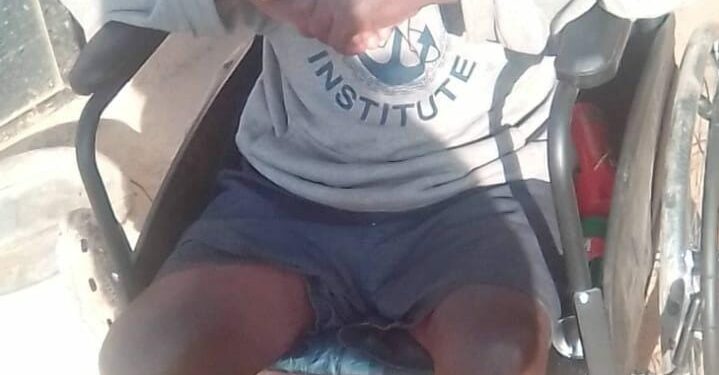EMALAHLENI – A family from Emalahleni has accused local public health facilities of providing substandard treatment, which they claim led to their mkhulu’s leg rotting and producing an unpleasant smell.
According to 25-year-old Nonhlanhla Skosana, the harrowing ordeal of her 64-year-old grandfather, Klass Skosana, began in November last year. He was allegedly denied medical care at two healthcare facilities: Mpungwe Clinic and Witbank General Hospital.
The incident occurred after Klass collapsed at his home in Van Dyk. Nonhlanhla recounted how she had to travel from Witbank to Van Dyk late at night after receiving a frantic call from neighbours alerting her to her grandfather’s condition.
“I arrived at the hospital around 7 p.m. and promptly brought him to Mpungwe hospital, where we were informed that his hypertension was severely elevated and since he was not under any prescribed medication, there was nothing they could do for him. We returned home and attempted to rest. Unfortunately, his condition deteriorated further, leading to continuous nosebleeds throughout the night,” she told the paper.
The next day, Nonhlanhla arranged transport to Witbank General Hospital, but they faced similar treatment, with lack of attentiveness. The family was disheartened when no medication was prescribed for Klass’s condition.
“Maybe we should have lied and said he was already on medication. Perhaps then we wouldn’t be in this situation, with my grandfather now unable to walk and constantly in pain,” Nonhlanhla lamented.
In early December 2023, a new issue arose when Klass appeared to have been bitten by something unknown, causing a wound on his leg. Subsequently, his lower limbs displayed signs of decay, indicating the presence of a severe bacterial infection known as “Necrotizing Fasciitis.”
Despite Nonhlanhla’s attempts to treat the wound using traditional remedies, his condition only worsened. The wound initially seemed to heal but later revealed a dark, festering lesion on his leg. Over the past eight months, Klass has been in constant pain, with the infection causing his leg to deteriorate further.
The family has since lost faith in public healthcare and is now seeking financial assistance to provide private medical care for Klass. Nonhlanhla, who is unemployed, relies on her husband’s income and Klass’s pension grant to make ends meet.
Necrotising fasciitis is a fast-spreading infection that attacks the muscle fascia and surrounding tissues. According to the National Library of Medicine, the infection progresses rapidly, making early diagnosis and treatment crucial to preventing life-threatening complications such as septicaemia and death.
Dr Harry Ledwaba, an Occupational Medical Practitioner, explained that although necrotising fasciitis is curable with intravenous antibiotics, it often requires surgery to remove dead tissue and, in some cases, skin grafts. “When not diagnosed and treated early it can be life threatening because it can lead to septicemia and death,” said Dr Ledwaba.
Mpumalanga Department of Health spokesperson Dumisane Malamule stated that public health facilities are mandated to provide medical care to all citizens and assured the family that an investigation into the matter would be conducted.
“We encourage the community not to leave the facility if they are not happy about services, and instead, they should report the matter immediately to the CEO or manager of that facility. The patient should visit the nearest health facility to get help as soon as possible,” said Malamule. According to the National Patients’ Rights Charter, every patient has the right to a healthy and safe environment, participation in decisions affecting their health, and access to proper emergency care at any healthcare facility.
























